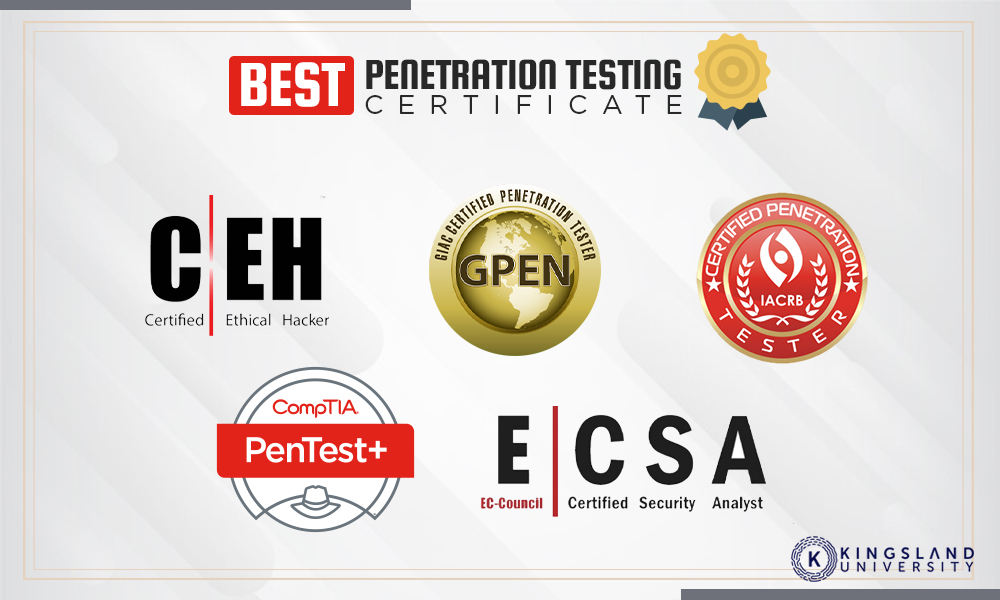
The world of cybersecurity has seen massive growth as the 21st Century marches on. More and more of our everyday lives have become digitized. From our financial transactions to our social interactions, everything we do is mainly conducted through online interactions rather than in-person.
This has led to the development of applications and websites that facilitate this new digital lifestyle. However, when making these applications and websites, the creators must be ever aware of the security risks that are inherent in online interactions. After all, once something is put online, it is there forever.
To protect their client base, companies must know what vulnerabilities their software possesses. This has led to the rise of penetration testing by authorized employees to verify what, if any, holes in their software exist so that they can be appropriately patched.
If you think you have what it takes to become a penetration tester, you might be wondering where to start. With this article, we hope to help you understand just what skills you need and steps to take to break into the world of cybersecurity and continue your path to becoming a professional penetration tester.
What is Penetration Testing?
Penetration testing colloquially referred to as a pen test, is a simulation of a cyberattack on a computer system, software, or application that is authorized by the developers. These tests are conducted to identify any weaknesses in the code of a digital platform or product that might open the gates for unauthorized users. These holes would allow hackers or other unsavory technological criminals to access privileged data that would jeopardize the customer, company, or both.
Penetration testing entered its infancy in 1965 after several leading computer security experts in the United States of America convened for the first official conference on system security to discuss the increasing concerns about unauthorized access to privileged information. However, it was not until the 1970s that the first penetration testing teams were put together to begin aggressive tests of software vulnerabilities. These ‘tiger teams’, as they were called, paved the way for contemporary penetration testing methodology.

There are three forms of penetration testing:
- White Box Test: White box penetration tests are conducted by contracted or full-time penetration testers who are given background information and details about the system they are testing in advance.
- Black Box Test: Black box penetration tests are, as you might have gleaned, the opposite of a white box test. The penetration tester is given only basic information about the system at best.
- Gray Box Test: Gray box penetration tests are hybrids of the white box and black box penetration tests. The test’s auditor is given limited information on the system to assess better the range of the test being conducted.
These different testing types are used at the discretion of the company developing the system at different stages in development. While the different types of penetration testing can determine certain aspects of your professional future in the field, there is more to consider when it comes to pursuing a career as a penetration tester.
Key Skills
As with every profession relating to cybersecurity and coding, multiple ‘key’ skills are required to be successful as a penetration tester. The skills associated with the profession can be divvied into ‘soft’ skills and ‘hard’ skills. ‘Soft’ skills are abilities and skills that, while highly desirable, can not be as easily quantified due to their interpersonal and subjective nature and are extremely difficult to train people to have. ‘Hard’ skills are easily quantifiable and taught techniques and skills with specialized training programs to help bolster the number of people with the skill.

There are specific ‘soft’ and ‘hard’ skills that translate into the field when it comes to penetration testing. The soft skills that are vital for penetration testing are:
- Learning Mindset: Because the threats that plague applications, websites, and other software are constantly evolving with the security measures that are implemented against them, those who run the tests to find vulnerabilities must be open to learning as they progress professionally. Allowing your skills to stagnate after establishing yourself as a penetration tester will only serve to atrophy your abilities to code against new, evolving threats that emerge.
- Teamwork: Penetration testers seldom operate solo. Instead, they are generally assigned to teams dedicated to launching multi-pronged assaults on the software to maximize their chances of locating any vulnerabilities that might exist. Therefore, you should be able to cooperate with other penetration testers to avoid conflicts on the job.
- Communication Skills: Tying in with teamwork, penetration testers need to be able to successfully express and explain their findings in a way that does not confuse or bog down their team. Using clear, concise terminology can be crucial if the team has less technically literate members than you.
- Report Writing: While it might seem odd, having strong writing skills is equally important to penetration testers as the other soft skills listed. After completing tests, penetration testing professionals are expected to draft reports to present to their management and executive teams to provide an outline of their findings and measures that were employed.
Soft skills are the sort of abilities that are cultivated from life experience and personality, making them virtually impossible to learn from your coworkers or supervisors. While they might seem otherwise trivial, they are essential to producing an effective professional even in a field as impartial as penetration testing and other coding or cybersecurity professions.

‘Hard’ skills are a completely different beast. While they can be taught, you will be required to learn certain ‘hard’ skills before even considering applying for a professional position. The ‘hard’ skills that are paramount to penetration testing professionals are:
- Vulnerability Knowledge: As you might expect, penetration testers with an expansive understanding of software vulnerabilities and security exploits are highly coveted. If you understand these things beyond the standard, automated procedures that are employed, you offer the ability to think outside the box and employ techniques others might have overlooked.
- Coding and Scripting: One of the most useful hard skills for penetration testers is a deep understanding of coding and scripting techniques. Understanding these aspects of computer science with fluency ensures that you have the knowledge you need to accelerate the time needed to complete individual tasks and create better security measures for any detected vulnerabilities.
- Operating Systems: Penetration testers need an advanced comprehension of standard operating systems to understand their software architecture better. By understanding the operating systems, you can better poke at potential vulnerabilities within them to perform more extensive and effective tests. The better your tests, the more likely you are to eliminate potential holes in the software’s security.
- Networking: One of the most critical aspects of penetration testing is putting yourself in the mindset of a hacker. Understanding how they operate allows you to more effectively determine how they might attempt to breach the software you are testing for. A fundamental part of understanding these hackers is understanding network protocols such as TCP/IP, UDP, ARP, DNS, and DHCP.
A healthy combination of these ‘soft’ and ‘hard’ skills will turn you into a viable penetration tester that most firms will be eager to hire. However, skillsets are not the only thing you will need to establish a career as a penetration tester.
Certifications
In the domain of cybersecurity positions, including penetration testing, there exist several certifications that help an applicant not only stand out as a candidate but also reinforces their skillset. Some of the best certifications for aspiring penetration tester professionals are:
- Certified Ethical Hacker (CEH) Certification: The CEH certification is, by and large, accepted a standard certification for anyone in a profession focusing on counteracting hacking attempts. This certification educates students on the latest hacking tactics and malware software to help stem the tide of potential software breaches. The exam is 4-hours in length with 125 questions.
- GAIC Penetration Tester (GPEN) Certification: The Global Information Assurance Certification (GAIC) GPEN certification is about the education of aspiring professionals on the technical aspects of ethical hacking and penetration testing and the legal aspects of the role. The exam is a 3-hour test with anywhere between 82-115 multiple-choice questions.
- Certified Penetration Tester (CPT) Certification: A certification from the Information Assurance Certification Review Board (IARCB), the CPT certification tests you on penetration testing for general purposes for Windows, Unix, and Linux operating systems, wireless security and web applications, and many other programs and software. This exam is a 2-hour test with 50 questions.
- PenTest+ Certification: The PenTest+ certification is offered by the CompTIA IT certification group that tests you on assessing system weaknesses and your aptitude for offering ways to resolve those weaknesses. The exam is almost three hours long, with 85 multiple choice and practical questions.
- EC-Council Certified Security Analyst (ECSA) Certification: The ECSA certification is one of the most coveted certifications in the industry. The exam tests your ability to perform network scans, analysis of system vulnerabilities, and other penetration testing essentials. Unlike other certifications, this exam is divided into two separate tests. The first is a 4-hour multiple-choice exam followed by a 12-hour practical exam. The multiple-choice exam consists of 150 questions, and the practical exam involves working on an official organization’s network.

Certifications are an excellent way to pad your résumé to stand out as an applicant for a position. In the field of cybersecurity and penetration testing, many certifications are considered mandatory as a proof of your skillset before a firm will hire you. While certifications will not boost your odds of getting hired by firms that require them, they are an essential component in starting your career.
Salary
One of the biggest considerations when contemplating your future in the 21st Century is the compensation you will be receiving for your career. This is no different for those seeking a career in penetration testing positions. As of 2020, the salary for penetration testers remains one of the most coveted in terms of quantity, with increases based on your experience level.
- The average annual salary for an entry-level penetration tester is approximately $66,380.00 per year.
- The average annual salary for a penetration tester in their early career is approximately $78,090.00 per year.
- The average annual salary for a penetration tester in the middle of their career is approximately $105,870.00 per year.
- The average salary for a senior level penetration tester is approximately $118,910.00 per year.

While these salaries can be extremely enticing, you would also be wise to consider the fact that these are not set in stone. Your payment will vary depending on your employer, who might offer slightly less or even more than the salaries we have listed here.
The Final Byte

Penetration testing is one of the most valuable positions in cybersecurity today due to its value in ensuring that software released for public consumption remains strong in the face of hack attempts. The value of penetration testers does not necessarily imply that becoming a professional is a simple matter, however.
To become a viable candidate for a penetration tester professional, you need to have several key skills to show that you can work in a team, communicate, and report your work, all while maintaining the desire to learn more about the field while it evolves. All of this is to be used in the pursuit of understanding coding and systems enough to analyze and resolve vulnerabilities in the software.
You also need to prove yourself by pursuing certifications to pad your skills while also demonstrating practical skills. Many employers will require some of the higher-end certifications to qualify for a position. While the salary you can earn as a penetration tester is alluring, you need to adjust and establish yourself in the profession to get higher rates. Ultimately, penetration testing is one of the most difficult yet fulfilling industries to break into.
What are your thoughts? Is there anything about penetration testing you’ve found interesting after reading this article? Are you interested in becoming a penetration tester after reading this article? Why or why not? Be sure to leave us all your thoughts and stories in the comments section down below!


